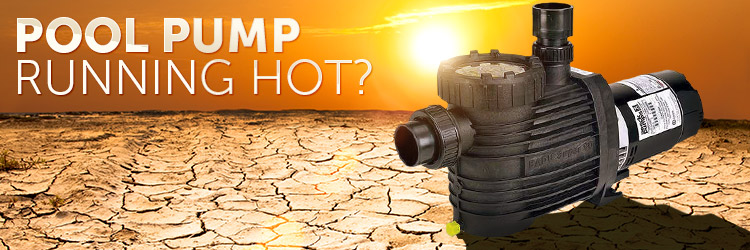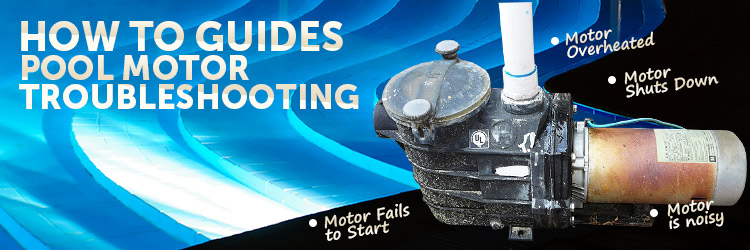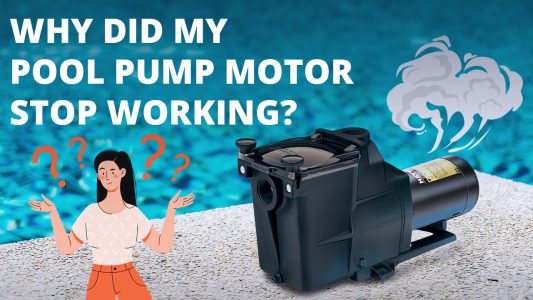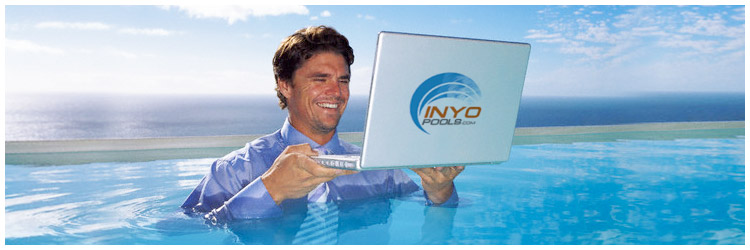The major functioning part in your pool pump is the motor, so it isn’t surprising that a lot of the questions we hear are about motors. One of the leading complaints we hear is, “My pool pump is running too hot.” Well, what exactly is too hot? We first want to note that it is normal for a motor to run hot. However, if it becomes way too hot to touch, or the motor label is starting to fade as a result, then you may need to check some things to ensure your motor is not overheating.
Sometimes a motor will cycle on and off at regular intervals. This occurs when the motor is running just a bit too hot. When the motor gets hot enough, the thermal sensor will cut it off until it cools down. Once it cools down, the motor should automatically turn back on. Here are some possible reasons your motor may be overheating.

The Motor May Be Receiving Improper Voltage
Improper voltage happens very often. If the voltage to the pump motor is 10% above or below the voltage stated on the motor specifications, the motor may overheat.
Double check the terminals at the back of the motor to ensure correct voltage. If it’s too low, either the wiring to the motor is insufficient or the power to the house is too low.
You also want to check the wiring diagram on the motor. Pool motors specify whether they can be connected to 115V or 230V or both. Some installers get this wrong. If the motor is hooked up incorrectly, it may run for a while but eventually, it will stop
If you need help testing the voltage to your pump then check out this Guide on How to Test Pool Motor Voltage.
The Pump Vents May Be Blocked
Pump motors are air-cooled and if the air is blocked, this may be a contributing factor to your motor overheating. Be sure to keep leaves, dirt, and debris from collecting around the motor. We offer protective motor covers to help safeguard the motor from outside debris.
The Pump May Have Internal Blockage
In addition to checking for blocked vents, you also want to check for internal blockage. Sometimes sand or fibers get into the impeller and can make the motor work extra hard. Here is a good guide which will give you more detailed information on How to Clean your Pool Pump Impeller.
You Ordered The Wrong Motor
Whenever we have a customer who calls about an overheating motor and they recently purchased it, we first like to verify if they ordered the correct motor. Ordering the wrong motor is an easy mistake that happens pretty frequently. For example, a customer will order a 1.0 horsepower full rated motor when they actually have a 1.0 horsepower up-rated motor. The incorrect motor may start and run for 15 minutes, but eventually, it will overheat and stop. To ensure you ordered the correct motor, you always want to make sure the total horsepower is the same. Multiply the horsepower by the service factor to calculate your total horsepower. This guide here will walk you through How to Select the Proper Replacement Pool Motor.
If you checked all the trouble areas and are positive the motor is overheating due to a complication, get in contact with the retailer where you purchased your motor. It could very well be the motor. The majority of motors have a one year manufacturer’s warranty and are usually fairly easy to swap out.












I don’t like running my pump in direct sunlight when it is hot. That has got to be heavy wear and tear which is unnecessary. I will not run it all day long—ever. That is total BS. I run it in increments of 3 hours. Very little under the sizzling sun. Keep it chlorinated, the water is sparkling. But then this is not AZ.
Hayward 1.5 hp Super Pump, 6 years old, runs 8-12 hrs per day year round.
Sounds normal, does not cut off, pressure and flow is normal, voltage is good, no leaks. All in all, function is normal.
But, all, of a sudden it gets VERY hot during the run cycle, too hot to touch and emits a burning odor. Also, the label is discolored from the heat….it’s the burning odor that scares me.
It sounds like it is working fine, so you should let it be for now. Motors get hot, as friction and heat are a byproduct of the motor running. This is an excerpt from one of our pool side chat episodes:
Hayward 1.5 hp Super Pump, 6 years old, runs 8-12 hrs per day year round.
Sounds normal, does not cut off, pressure and flow is normal, voltage is good, no leaks. All in all, function is normal.
But, all, of a sudden it gets VERY hot during the run cycle, too hot to touch and emits a burning odor. Also, the label is discolored from the heat and even some of the paint is beginning to peel.
Is the motor shot? Can I safely just let it go until fails.?
Pool pump motors, even new ones, normally run between 115 – 200 degrees Fahrenheit. The human body registers “hot” at about 115 degrees. So when a motor is running if you touched it you would probably recoil from it. It sounds like your pump is running as it should so I’d let it go on about its business. A shot motor doesn’t run. As you said, your motor has had 6 seasons out in the elements; that also means 6 seasons of sunlight and rain hammering away at that label. There is no label around that can stand up to that type of application without fading or degrading.
Lastly, do not touch your motor while it is running because you could get a nasty shock.
Is it normal for a pentair pool pump to blow air from the unit, is this how it stays cool and from over heating.
Yes, it is normal to have movement of air from the motor.
The pool pump in my sister’s pool is overheating. Long story short she put a new pump in and the same thing is happening. Voltage, suction, breaker, skimmers, EVERYTHING WAS CHECKED – everything is fine. Could this be caused by the main drain at the bottom of the pool somehow being clogged? This situation is driving us crazy. 5 different ‘experts’ and electricians and plumbers have looked at it. Everyone’s at a loss!
If your strainer basket is not filling up with water, then a clogged pipe could be the culprit. If you have checked everything else except the main drain, that would be the very next thing I would inspect. We have a video guide that explains how to use pipe clearing bladder, which may be ideal for your drain issue.
My pump motor gets hot after I vacuum and there is air purging in the filter.
Forgot to mention. When I’m done vacuuming the pool, the pump motor gets hot and shuts off. I can hear air purging in the filter and then it shuts off. I know it isn’t water cooled so what causes this?
If this problem only happens after you vacuum, a couple of things come to mind. Your system may be gulping air because you are not keeping the vacuum head submerged while the pump is running. Or, you may have pinhole leaks in your vacuum hose making your pump draw sips of air. If there is air in the system, that means the motor can run lightly loaded which causes a surge in voltage and leads to failure.
If you think you have an air leak somewhere else in the plumbing give this guide a read: How to Identify and Correct Air Leaks
What does it mean if the pool pump is getting hot but the pump isn’t running and the sun is not hitting the pump?
It is a metal casing in the summer, they get hot. Unless there is an actual mechanical issue with the motor, I wouldn’t worry about it.
Our younger cousins will be coming over this weekend to enjoy the swimming pool at home, however, our pool pump isn’t working properly. I never knew that pump vent can be blocked and that it’s important to clean it regularly. Moreover, it’s important to order the correct pool pump motor to avoid overheating. http://usa.speck-pumps.com/pool-products/